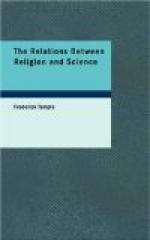It is clear that determinism does not get us out of the difficulty. Here, too, as in regard to the necessary truths of mathematics, and in regard to the relativity of all our knowledge, the theory has purchased completeness by the cheap expedient of calling one of the facts to be accounted for a delusion. Such a solution cannot be accepted. In spite of all attempts to explain it away, the fact that we think ourselves free and hold ourselves responsible remains, and remains unaffected.
But let us examine how far the difference between the scientific view and the religious view of human action extends.
Observation certainly shows that a very large proportion of human action, much even of that which appears at first sight to be more especially independent of all law, is really as much regulated by laws of nature as the movements of the planets. I have already pointed out how often an observer can predict a man’s actions better than the man himself, and how often the will is certainly passive and consents instead of acting. In these cases there is no reason whatever to deny that nature and not the will is producing the conduct. And not only so, but that which seems most irregular, the kind of action that we call caprice, there is very often just as little reason to call free, as to assign free-will as the cause of the uncertainties of the weather. But it is not in observing individuals so much as in observing masses of men that we get convincing proof that men possess a common nature, and that their conduct is largely regulated by the laws of that nature. That amongst a given large number of men living on the whole in the same conditions from year to year, there should be every year a given number of suicides, of murderers, of thieves and criminals of various kinds, cannot be accounted for in any other way than by the hypothesis that like circumstances will produce like conduct. So, too, in this way only can we account for such a fact as the steadiness in the proportion of men who enter any given profession, of men who quit their country for another, of men who remain unmarried all their lives, of men who enter a university, of men who make any particular choice (such as these) which can be tested by figures. Now, this argument is unanswerable as far as it goes; but it succeeds, like all the other arguments for the uniformity of nature, in establishing the generality, and not at all the universality of that uniformity. Indeed, it falls far short of proving as much uniformity in human action as is proved in the action of inanimate things. The induction which proves the uniformity of the laws of mechanics, of chemistry, of physics, is so far greater than the induction which proves the uniformity of human conduct, that it is hardly possible to put the two side by side. When we turn from abstract arguments to facts, the doctrine of necessity is unquestionably unproven.




